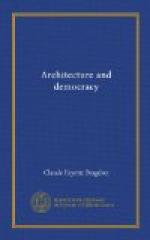It is for the restoration of these ancient verities and the discovery of new spatial rhythms—made possible by the advance of mathematical science—that the author pleads. Artists, architects, designers, instead of chewing the cud of current fashion, come into these pastures new!
[Illustration]
[Footnote 1: The eight cubes in A, Figure 14, are as follows: abb’d’c’c; ABB’D’C’C; abdDCA; a’b’d’D’C’A’; abb’B’A’A; cdd’D’C’C; bb’d’D’DB; aa’c’C’CA.]
[Footnote 2: The sixteen cells of the hexadehahedroid are as follows: ABCD: A’B’C’D’: AB’C’D’: A’BCD: AB’CD: A’BC’D: ABC’D: A’B’CD’: ABCD’: A’B’C’D: ABC’D’: A’B’CD: A’BC’D: AB’CD’: A’BCD’: AB’C’D.]
HARNESSING THE RAINBOW
Reference was made in an antecedent essay to an art of light—of mobile color—an abstract language of thought and emotion which should speak to consciousness through the eye, as music speaks through the ear. This is an art unborn, though quickening in the womb of the future. The things that reflect light have been organized aesthetically into the arts of architecture, painting, and sculpture, but light itself has never been thus organized.
And yet the scientific development and control of light has reached a stage which makes this new art possible. It awaits only the advent of the creative artist. The manipulation of light is now in the hands of the illuminating engineers and its exploitation (in other than necessary ways) in the hands of the advertisers.
Some results of their collaboration are seen in the sky signs of upper Broadway, in New York, and of the lake front, in Chicago. A carnival of contending vulgarities, showing no artistry other than the most puerile, these displays nevertheless yield an effect of amazing beauty. This is on account of an occult property inherent in the nature of light—it cannot be vulgarized. If the manipulation of light were delivered into the hands of the artist, and dedicated to noble ends, it is impossible to overestimate the augmentation of beauty that would ensue.
For light is a far more potent medium than sound. The sphere of sound is the earth-sphere; the little limits of our atmosphere mark the uttermost boundaries to which sound, even the most strident can possibly prevail. But the medium of light is the ether, which links us with the most distant stars. May not this serve as a symbol of the potency of light to usher the human spirit into realms of being at the doors of which music itself shall beat in vain? Or if we compare the universe accessible to sight with that accessible to sound—the plight of the blind in contrast to that of the deaf—there is the same discrepancy; the field of the eye is immensely richer, more various and more interesting than that of the ear.




